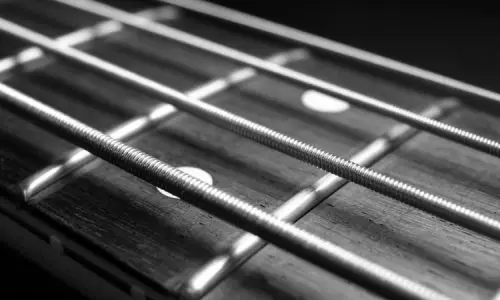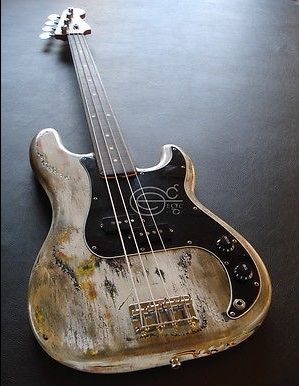Fret buzz is annoying and can also hamper the overall guitar-playing experience. Yet, fret buzz is a common problem on bass and may have numerous reasons behind it. You should hunt the culprits from where the buzz comes from.
Even minor fret buzz can be caused due to underlying problems in your guitar. Some players are okay with a little bit of fret buzz, as it suits their playing style. However, excessive fret buzz is an indicator of either poor technique or your instrument might need some adjustment.
After sharing experiences with my peers, I found that (to my surprise) some people are ok with minor fret buzz on their. However extra fret buzz is a clear sign of any problem in your bass or guitar that needs fixing.
Note: It could be the case that your amp is buzzing instead of your bass. If that’s the case, you may want to check out my other articles regarding amp buzzing:
- The Secret to Silencing Fret Buzz: A Guide for Guitar and Bass
- Complete Guide To Stop EVERY Type Of Buzzing Noises For Amp!
- Buzzing & Hissing Amps: Is It Normal? Find Out & Stop It!
Is Minor Fret Buzz Acceptable On Bass?
Minor fret buzz on bass is generally acceptable and common. The strings on a bass are comparatively thick and are less flexible due to which they vibrate at a low frequency, and as a result, more prone to buzzing.
There isn’t a concrete answer when it comes to the acceptability of fret buzz on bass. Some people accept it, some don’t. It totally depends on the technique of the player.
However, if it is bothering you, there are multiple ways to get rid of it.. If the fret buzz is decreasing over time, you can just ignore it, as it may vanish anyways. However, if it is increasing or becoming annoying, you should definitely look for a solution. Let’s talk about the cause and prevention next.
Common Causes & For Fret Buzz On Bass
Here are some of the common reasons behind fret buzz on bass;
1. Uneven Frets

The frets are meant to be leveled with each other, when they have a difference in height, frets become uneven and cause fret buzz because the strings come into contact with the frets inconsistently.
When you use a guitar for years, the strings are rubbed onto the frets multiple times with immense pressure, and frets break down or wear out with time, as a result; you get uneven frets that are a clear culprit behind fret buzz on bass.
When some frets are taller or shorter than others, the buzzing is inevitable. Uneven frets are the reason that strings don’t get the proper space to vibrate. You can identify if your bass has uneven frets even by looking at it closing from the top.
Also Read: Guitar Refret: When, How Often & How To Know (Is It Worth It)
2. Very Low String Action

String action is the height of guitar strings. Extremely low height (action) can also result in fret buzz, which is pretty common in the bass.
The height of frets is also important, the same as the height of strings plays a pivotal role in producing a smooth tone. There are some players which prefer high action, but some prefer low.
However, the action is meant to be adjusted properly in order to avoid any buzzing in the bass. Sometimes the aim is to play as low as possible without causing any buzz.
Also Read:
- Low Action String: Is Fret Buzz Ok? (Guide To Stop & Fix It)
- Best Action For Bass: Is High Action Bad? (+ Ways To Check)
3. Lack of Neck Relief

When the neck is too straight or bowed backward, there are higher chances of fret buzz on your bass, the neck is not meant to be straight, it should have a minor dip, which is often known as neck relief. Lack of neck relief is certainly responsible for fret buzz. A back bow means that there is not enough neck relief on your bass.
Appropriate neck relief is essential for providing the strings an ample amount of space to vibrate properly.
When neck relief is adjusted, strings don’t hit the frets. However, too much neck relief should also be avoided. Neck relief is an important factor to consider if you are wishing to solve fret buzz on bass.
Also Read: How To Adjust Truss Rod To Fix Fret Buzz: Which Way To Turn?
4. Not Enough Pressure

Sometimes you are not pressing down hard enough on the frets and that becomes the reason behind the annoying fret buzz.
As the strings of the bass are thicker, you need to put extra pressure to press them properly. Moreover, a dirty fretboard can also be the reason you are hearing a buzzing sound from your bass.
Also Read: 7 Simple Ways To Make Guitar Strings Easier To Press
5. Built Up Dirt

Over time, you take your bass to numerous places where there are extremely low and high temperatures, and dirt too. Dirt and dust can easily accumulate on the fretboard. It might not be visible to you, but it is surely playing its part in causing fret buzz on the bass. This is one of the main reasons that you might experience fret buzz more in the old guitars in your storerooms.
How To Prevent Fret Buzz On Bass
Here are some of the ways you can prevent fret buzz on bass;
1. Level Your Frets
As uneven frets are one of the most common causes of buzzing on bass, you can get them leveled by consulting a professional who knows the right technique to fret dress, it is a procedure where frets are shaved down an appropriate height, or the professionals can even replace them.
Don’t try to fix the frets on your own, as it is a very tricky process. You need the right tools and information to properly arrange and level the frets.
You should get the frets of your bass checked before jumping onto any other solution to prevent fret buzz in the future.
2. Raise the Action
When the action is too low, the buzzing is pretty common. There’s no denying the fact that players often like low action, but it needs to be adjusted properly in order to avoid fret buzz on bass.
You can properly set up the bass before you play again. Raise the action a bit, and leave it at a point where the action is low, but there is no buzzing if you prefer low action. You can also use a string action gauge to solve your problem.
3. Adjust Truss Rod
Adjusting the truss rod is one of the finest ways to prevent fret buzz in the future. So, what’s a truss rod? It is a metal rod inside the neck of your bass which is responsible for bending it properly. When the buzzing comes from the middle of the fretboard, it is usually due to the bending of the neck in the wrong direction.
If you have no neck relief, then you might consider turning the truss rod counterclockwise and if you have excessive neck relief, you may wish to tighten the truss rod. However, if you are planning to tighten the truss rod and reduce the neck relief, you need to turn the truss rod clockwise. Make sure you have the right keys to adjust the truss rod.
4. Clean the Fretboard
It is better to protect the bass from extreme temperatures, low humidity, and dust. However, if it becomes dirty over time, you can clean the fretboard using steel wool. Make sure you clean it properly without damaging the fretboard.
5. Practice More
As mentioned before, not applying the right pressure on the strings can also cause fret buzz. In such cases, you need to practice more and get the hang of applying enough pressure to avoid fret buzz on the bass.
The Impact Of Fret Buzz: Bass Vs Guitar
Guitar fret buzz is more noticeable when compared to bass. One of the main reasons behind this is that minor fret buzz on bass can add up to its overall bass sound, but on guitar, it is much more prominent. That said, some people might find that even minor buzz on bass annoying, – it really depends on the playing style.
If you are playing an acoustic or electric guitar, fret buzz is more-clear as it can affect the overall tone of the guitar, but fret buzz on bass can be ignored if you have a playing style that prefers a bit of fret buzz.





